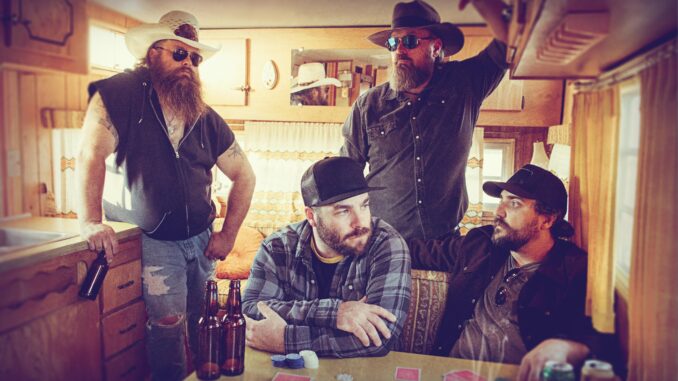
The Barlow is a band in high spirits these days with a brand-new album, their fourth, that’s worth some serious fist-bumping. The band calls their brand of music Colorado Country, and it’s as rugged as the Rockies, as authentic as Aspen and bolder than Boulder. From Colorado, they may be 1000 miles, give or take, as the crow flies down I-25 to Austin, but they would have no trouble fitting into the Texas music mecca. Their sound has the feel of a Texas barbecue on a summer night, smoky and rich, with guitar riffs sizzling like brisket on the grill.
“Denver is a hard place to launch from; it’s so far from everything … all the places we would fit in. It’s a music scene that isn’t on anyone’s big, national radar. But for us, that just means we have the opportunity to work harder for our wins!” These are the sentiments of frontman and founder of The Barlow, Shea Boynton. Jason Berner on bass, Brad Johnson on lead guitar and harmony vocals, and Big Ben Richter on drums, round out the Colorado quartet.
The new album is aptly titled “High Spirits,” not so much for the lyrical content of its songs but for the overall way they can make you feel. Spring is in the air, and this is the kind of music you listen to with one hand on the steering wheel and the other on the volume control, driving home from work on a Friday afternoon with a six-pack riding shotgun. The title song sets the scene from the very first verse.
“Empty bottle shrine king Prine Paycheck and Jones / Coors Light neon sign quarters and dimes and I’m never alone / Light me up another of them Lucky Strikes / Ain’t got no one to say otherwise.”
“While there’s a few narrative pieces, the songs are mostly based on personal experience,” Boynton declared. “Each record is a step towards defining our sound and what we do. Instead of comparing things to others’ sound or style, we aim to make it our own.”
The Barlow’s songs are written with a heart-on-sleeve sincerity and lyrical directness, focused on hooks and played with loud guitars. Their albums are – as Boynton likes to label those from bands he admires like Turnpike Troubadours and Whitey Morgan & The 78s – back-to-fronters. Let’s suppose those ten songs on “High Spirits” were bowling pins. You’d surely want to throw a strike and not leave one or more standing. Or, to put it another way, if the album was a dollar bill when you ask for change back, you’d get all ten dimes, not eight or nine and a couple of slugs.
Don’t try serving The Barstow a diet version of cool.
Hi, Shea. I was just looking at your Facebook page and saw this picture of what looks kind of like a shack where the band recorded the new album.
What you saw was probably Brad Smalling’s house. His studio, where he engineered our record, is off to the side. He helped produce, but we’re more or less self-produced for better or worse. We used Wes Sharon to mix it. He’s a pretty decorated fellow. Among others, he recorded Turnpike Troubadours’ “Diamonds and Gasoline.”
I read about you working the Colorado oil fields as the band was getting started. Then, you went to the fields in North Dakota. A few years back, I read a great book by Charlie McDuff, who is a newspaper writer in Detroit, called “Shit Show.” It was about the rage in America from working-class people towards their leaders. The first chapter was on workers who spent six months straight working oil fields in North Dakota.
The field I worked is in northwestern North Dakota; the Balkan is what it’s called. It’s an interesting place. I always say it’s a dude in a white truck. It’s a pretty one-dimensional town. All they do is oil and gas stuff up there. Work all day and not much to do at night. It’s nothing for them to see negative 20 degrees, negative 30, and there’s no cover, so the wind just rips your face off, and it’s brutal.
At least there was time to write songs if you weren’t too wiped out.
When I was up there, I didn’t have a guitar, so it was all just working on lyrics. The good thing is everybody there has a story to tell. Most wouldn’t have been there otherwise. I mean, a lot of broken families. It’s no secret that the oil and gas industry tends to be boom or bust. For some of those guys, when it’s good, it’s new boats, new jet skis, new lifted trucks, et cetera. And then, when the bottom falls out, here comes the repo man.
You are done with oil fields now? Full steam ahead with the band.
I still do outside gigs in construction, which honestly, I prefer. I love playing music and we dedicate a lot to it, but I like not having to do it from a place of desperation. I have a wife and kids, as do some of the other guys, and I like keeping that intact.
You call your sound Colorado Country. There are other elements floating around, but country rock seems to fit.
I think live, we’re more of a Southern rock band. We are definitely louder live than we are on record, but that’s okay with me. You don’t want to play note for note off the record, but put your own twist on it live.
What kind of music did you listen to growing up? I saw a picture of you on Facebook with a Billy Joel t-shirt.
He was a big one in our house, him and Elton John. I love the old Elton John stuff. “Caribou,” “Tumbleweed Connection.” Those early records where there was a huge nod to Americana and country music. To me, those are some of the best records he ever made. Allman Brothers is also a big one for me, but a lot of punk rock growing up. Probably in my early twenties, I started to venture into the country rock.
There’s something of a Doobie Brothers vibe on your new record. Not quite as raw as the first three.
I think there’s elements of it that have remained constant. Collectively, we all really liked the same contemporary bands. That was our biggest common ground and probably the sound we were chasing the most. But as time has gone on for me, I’ve realized, just being in this industry, that if you have a band or an act that is very unique and you break out with that sound, that look or whatever it is, you tend to see a lot of artists that kind of come in behind them that are chasing that. And to me, that’s always felt like a diet version of cool.
I had this epiphany along the way that we have to be unique and different in our own way enough to where somebody doesn’t listen to The Barlow and go, oh, that sounds exactly like so and so or this band. They’re chasing cool. I’ve gotten to the point where I don’t want to because, by the time you get there, it’s either not, or again, you just end up as a diet version. This new record, I really tried to make it homogenous but also letting each song be different. Maybe to the listener it might not be a front-to-backer for them because of that, but I think there will be listeners who appreciate that. Take a band like Blackberry Smoke; they do it all genre-wise. It works for them.
You’ve changed bass players like socks – slight exaggeration – but the rest of the band has been constant. You are the main songwriter, however.
Yeah, I’ve known the other two guys since high school. I wrote the majority of this record, but Craig Bennington, who sort of co-produced, was my sounding board for everything. He and I kicked demos back and forth through the whole duration of writing it, and that was new to me, but I really appreciated it. I mean, I love the other guys in their band, and their input is always really good and the touch they put on the music is always needed, but those guys aren’t songwriters. Craig spent a bunch of time in Nashville around songwriting and studio work, and his input was really good as far as change this word, move this around, try structure it different this way, the very nitty gritty of the song before it was brought to the band.
How did y’all hit on the band name?
It’s funny. A lot of people think it’s in reference to the pocket knife, a Barlow knife, which was big in the fifties and sixties, but it wasn’t. I was living in Fort Morgan at the time, northeastern Colorado, working in the oil field. I had a buddy from California that was living with me, and it was kind of a joke because in California, they say you’re going to take the one to the 10, whereas in Colorado, we say I-70 or I-25 when we use the interstate. I was just messing with him and he was going to Walmart, and I said, “Hey, you going to take the 34 to the Barlow?” which is the road Walmart was on. It went on like a light bulb. Cool name.
Let’s talk about the new album. What would you say is the most country song on the album and why?
Probably ‘Los Angeles Saloon’ with the saloon-style piano. I actually didn’t write that song. It was written by Chad Price, who’s in a band called Drag the River from Fort Collins, Colorado. That was the point: to cut a Colorado band song and give a nod to those guys—one of my favorite bands. Casey Presswood played steel with them. He’s with Jelly Roll now.
What would you say is the most joyful track on the record?
I don’t write joyful songs; I like sad songs. The most joyful, probably is ‘High Spirits.’
Sounds joyful to me. That’s also the album title.
The song is over two years old. That’s what prompted the record. Initially we went in to cut that with two others – ‘Dreams for Tomorrow’ and ‘Standing Next to Me.’ We were just going to drop ’em as singles and let that be that. But our bass player dug his heels in and said this could be a title track to a record. He didn’t want to see it get buried as a single. There’s a bar in Arvada (Colorado) called the 12 Volt that every time I listened to that song, I pictured a guy, the character, sitting at it. It was a dive bar. Anyways, the character is tying one on, and there’s an old jukebox and an old pool table, and he’s just in denial and drinking his sorrows away.
So, ‘High Spirits’ is more like the character in the song drinking “spirits”, aka alcohol. What is the saddest song? You should have plenty to choose from.
Probably ‘It Ain’t Mine.’ That’s loosely based on a friend of mine that spent some time running around with biker gangs and found a lot of trouble at home. It got me thinking about the kind of false love that maybe you would start to find yourself in when the person that this woman fell in love with began engaging in activities that eventually the thing she thought she was signing up for materialized into this other thing that has this thread of a farce.
So, was he in like a “Sons of Anarchy” type of gang?
I’ve never watched that show. I’ve spent enough time around him and all those guys to know that I didn’t like it. They felt like bullies to me, and I didn’t like their power in numbers trip.
Let’s go with the coolest bass line.
That’s always one of those things when you get in the studio, and Jason starts recording and you’re like, oh, that’s what you’re doing, really cool. ‘Turn Tail and Run’ probably. As far as the tastiest, ‘Clean’ probably has the tastiest bass riffs. Maybe not the most technical, but definitely the tastiest, which I’ll take tasty over technical any day.
What song reminds you of your hometown or state?
Again ‘Clean’ for a lot of reasons. That one’s pretty personal. I’m originally from southern Maine. I only lived there until I was six, and I’ve been here in Colorado ever since. Probably don’t want to get into why, but that one brings me back to New England for sure.
Do you ever go back to New England?
I was just there three weeks ago. Took my son to a Bruins game.
Hockey fan, eh? Are you watching the game tonight? US vs. Canada. (We go on for several minutes about NHL hockey and why I despise the Colorado Avalanche – because they took the franchise from the Quebec team.)
Yeah, I’ll be tuned in for sure.
What is the best song to get people into your music? Out of any of The Barlow’s songs.
‘Josephine’ is our big one. That song has done the best on all the streaming platforms. That’s not a bad intro to the band. It has a good mix of some of the country flair we have and some of the rock.
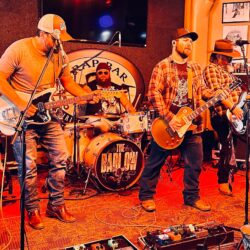
That was on your previous album, “New Year, Old Me.”
The one I really like best is ‘It Ain’t Mine.’ That’s always weird, right? When you’re trying to pick singles to push out, we’re always wrong. ‘Josephine’ was one we were right on. ‘Obsessions’ was one that we never pushed as a single, and it’s done really well. All the marketing in the world doesn’t matter. It’s the audience that decides for you.
The title song is a good one. I like that line about life going to throw me a rope.
I love playing that song live. When every year New Year’s comes around, people want to reinvent themselves, and they latch onto these resolutions that just don’t last. Going through my thirties, you get to a point where you’re just comfortable with who you are. For better or worse, I still, to this day, listen to a lot of the same things that I did twenty years ago. That’s a tale as old as time. You could ask people that grew up in the seventies and they’ll tell you every Zeppelin song that was ever made. That’s just the soundtrack to their youth. So, that song is really a nod to not changing, and it’s okay to do the same things and act the same way. It’s kind of a goofy song.
Another standout from that album is ‘Tarred,’ about differences which seems even more relevant today.
I wrote that song about my brother. We’ve had our differences growing up, and I think we’ve mended those fences. That song really never got its day in the sun. We just never played it much live, which is a shame. You could take it as about political differences, too, but we’ve never played politics with the band. I hate to say I’m a shut-up and sing guy, and I know there are other acts that preach, but to me, music isn’t the place for that. We get enough of it everywhere else, so music should be an escape from that. Besides, there are mixed feelings within the band about politics, so it wouldn’t be a unified message.
Looking over the band’s tour history, you tend to stick mostly to west of the Mississippi. Still plenty of miles. How do you guys go down the road?
We’ve got a little 25-footer RV with a trailer now. We had a van for a while, and I remember doing a run up through Wisconsin and on the way back I’m like, I’m not doing this again. It was just brutal. Everybody in the band is not small. And many of the joints we play don’t have green rooms, so the RV is just a green room on wheels. It’s nice for us to have a place to go that’s quiet, where we can relax and not have to drive back and forth to a hotel. We can pull up to a venue, unload our stuff, set up; then we can go relax, lay down, watch TV, use the bathroom. We have a fridge. It’s just nicer.
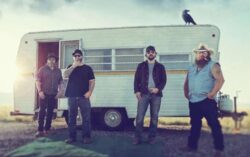
What do you guys eat while on the road? And is it a collective decision, or does someone call the shots?
Frankly, it’s mostly garbage, gas station food, Taco Bell, a lot of snacking. Some venues have kitchens and we will take whatever they’re offering. If we go to Texas, we’re getting barbecue for sure.
If you have one CD to listen to all the way from Colorado to Texas, what would it be?
I’m going to try and speak for everybody. Something that nobody would pull their hair out on. My choice is going to be Thin Lizzy, but there might be one of us that would go a little crazy with that. Probably a Turnpike Troubadours record. We listen to “A Cat in the Rain” a lot. Maybe the first Steel Woods record, the one with the newspaper on the cover.
Has anyone ever expressed that they liked your music that you didn’t see coming?
Yeah, the drummer from Big Head Todd. I was kind of surprised when he came out to a show and knew almost every word to every song. And he’s a great dude, been kind of a mentor. I’d send him the new record when we were going through the mixing stage, and he gave me his 2 cents on stuff, like, I’m yearning for more vocals here. Stuff like that.
We went out to California with them. Brian is just a good guy. We randomly text just to check in and see how our tours are going. There’s nothing in it for him. He’s just a nice guy who likes our music and believes in what we’re doing.
What do you say has been the best moment in your musical career while assuming the best is yet to come?
We played Denver at the end of last year and sold out. It was probably a 200-cap room. We busted our ass to push the show and get our fans out. I remember right before we walked on stage, I heard, “Hey, it’s sold out.” We’ve played every little dive bar corner shit-paying gig in this area of the country, and it was good to have some of it feel like it paid off.
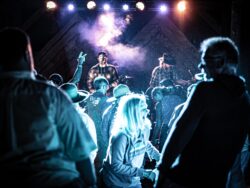
Was it Grizzly Rose in Denver? I saw pictures on Facebook.
No, but that was a good one, too. Grizzly Rose is a classic staple in Colorado. They get a bunch of big national acts through there, and they always have a house band for support when the national comes through. It was cool because we got brought in on that show, so we didn’t have to do the grind of being a five-night-stand house band. We just got to go play our show and do the songs we wanted to do.
Besides Big Head Todd, what other bands have you enjoyed playing on tour with? I saw a picture of a merch table with a t-shirt that read Whitey Morgan is an asshole. A term of endearment for sure.
We’ve played with a bunch of bands that we admire, and I don’t really fan girl on any of them. It’s just we live in that world, and it’s not something that I get giddy about. But Whitey is one for me that could get stuck in the dash, and everybody would be okay with. We went out with him for four nights, and I watched every night, every note. He puts on such a great show, and his catalogue of music is fantastic. That run was another big highlight for the band.
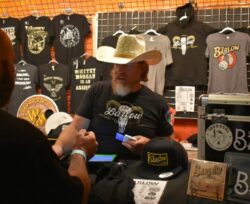
I mean, an elitist would probably tell you Whitey’s early stuff, but I really think he hit his stride with “Sonic Ranch” and “Hard Times in White Lines.” To me, both of those records are front-to-backers, and he just put out a new single that’s fantastic as well. It’s kind of a deviation from the typical Outlaw country stuff. He’s from Michigan, and his new song is called ‘Somewhere Along the Way.’ He wrote it with Cody Jinks. It’s a very cool nod to Bob Seger and Detroit and that whole vibe.
What would you say is something you learned during your career starting out or whenever that really stuck with you?
I think learning to say no, and we’ve learned that lesson the hard way a couple times. You either end up doing shows that you really have no business being at. Vetting what you’re doing is a huge deal, and that comes with balancing everything, too. Again, we all have families that we want to keep intact and balancing the tours, and all the stuff that goes into it has been critical for us staying together as long as we have because there have been times where tensions are high and some resentment back home. It’s like trying to find that balance that works where you’re home enough to spend time with your family, and we’re dedicating enough to The Barlow. Saying no is a very big part of that. Saying yes is, too, but when we do it, we want to make it count.


